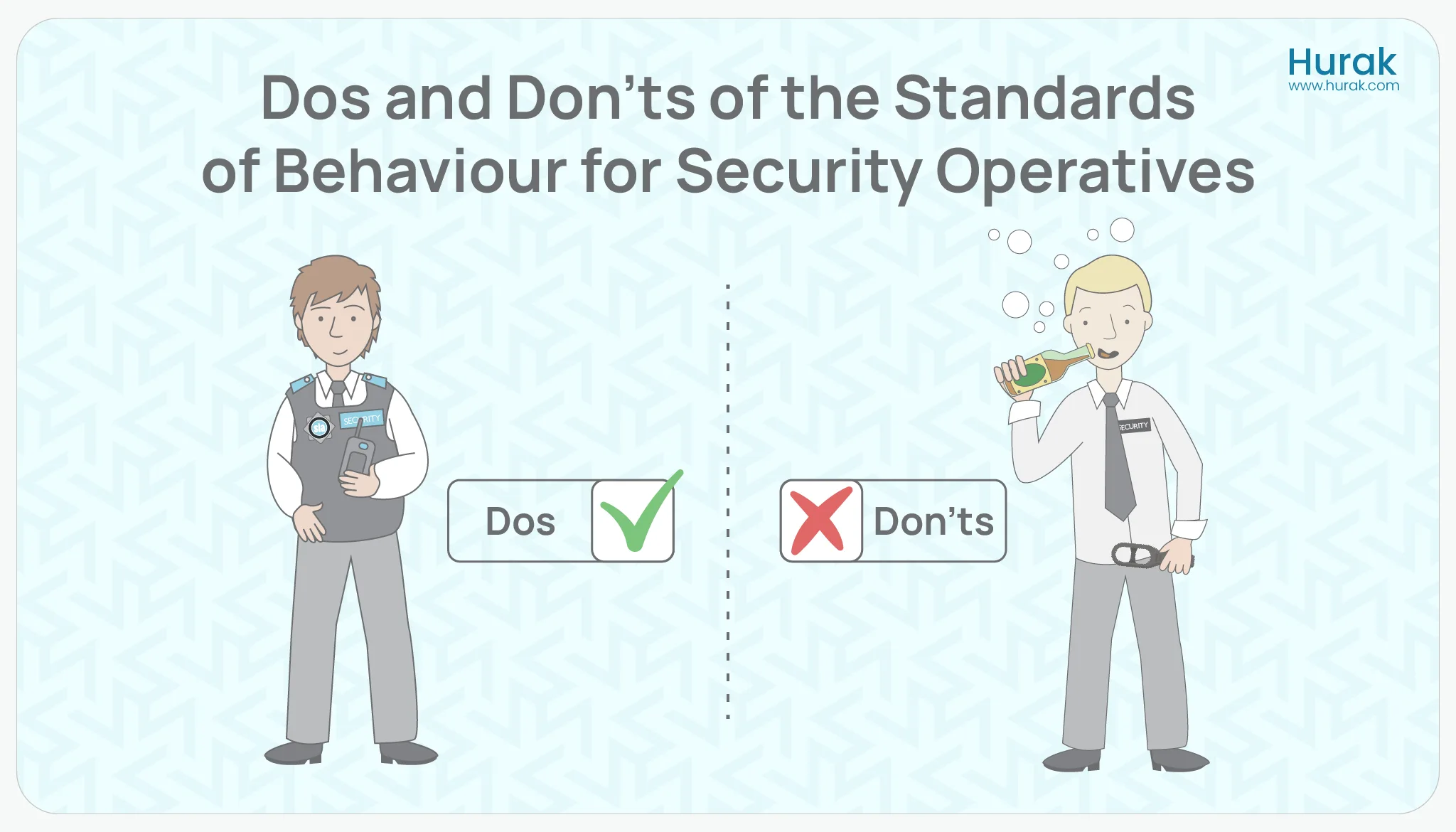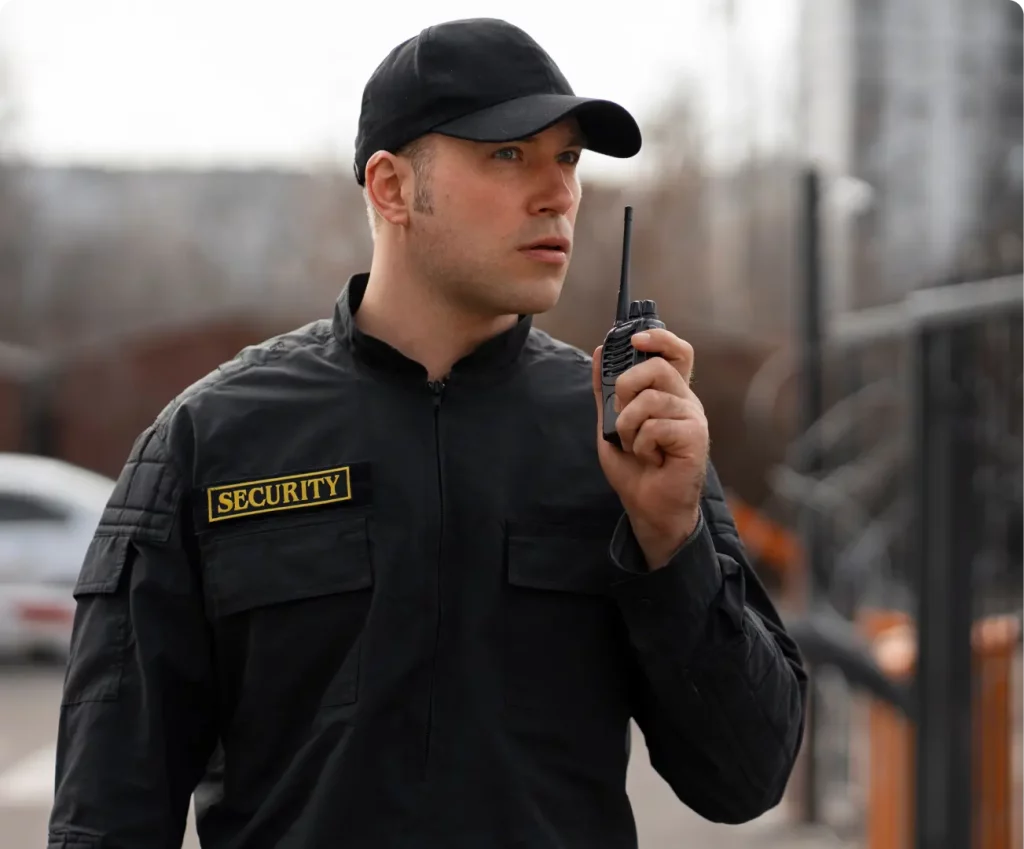The SIA requires people in the private security industry to follow specific standards of behaviour and act professionally, skillfully, and ethically. Not following these rules can lead to disciplinary action, such as losing their SIA license. The private security industry in the UK is significant, employing thousands of people and playing an important role in the economy.
What are the Standards of Behaviour for Security Guards
UK security guards must follow strict professional conduct standards set by the SIA. This means they must carry out their duties with honesty, integrity, responsibility, and respect for others. Guards must avoid behaviour that could damage public trust in the security profession. This includes:
- Accepting bribes
- Falsifying incident reports
- Sharing confidential information
- Abusing their authority
- Working under the influence of drugs or alcohol, which affects judgment
While on duty, guards should stay calm under pressure, resolve conflicts through clear and non-aggressive communication, and only use force as a last resort. Serious misconduct, negligence, or failure to follow these standards can lead to suspension or loss of their SIA license.
Conflicts of Interest
Security guards must not engage in activities that create actual or perceived conflicts of interest. For example, a guard working at a shopping mall cannot also work for a retailer within the same mall, as their roles may conflict.
Guards must never use their position for personal gain. For instance, allowing unauthorised access to a warehouse for illegal activity in exchange for money violates trust. Any potential or actual conflicts of interest must be reported to employers immediately.
Discrimination and Human Rights
Security guards interact with people from diverse backgrounds and must treat everyone fairly and respectfully. The SIA forbids discrimination based on race, religion, gender, disability, sexual orientation, or other protected characteristics.
Guards must not engage in harassment, intimidation, or unfair treatment. For example, targeting someone based on their ethnicity or stereotypes is considered discrimination.
While performing their duties, guards must:
- Only take actions (like limiting access) when there is a real and valid reason, not based on bias.
- Make reasonable accommodations for disabled individuals to ensure fair treatment.
Guards must also respect the rights of others and not exceed their lawful authority. Actions like improper detention, excessive use of force, or restricting freedoms (e.g., movement, expression, or assembly) violate SIA standards.
Security guards uphold professionalism, integrity, and UK laws by acting fairly and ethically. SIA licensing requires ongoing training to help guards apply human rights principles daily.
Activity/Behaviour | Code of Ethics & Conduct | Consequences of Breach |
Ethical Conduct | Guards must perform their duties with honesty, integrity, and respect for others. | Licence suspension or revocation |
Conflicts of Interest | Guards must avoid situations that create actual or perceived conflicts of interest. | Disciplinary action or dismissal |
Discrimination and Human Rights | Guards must treat everyone fairly and uphold human rights in all interactions. | Legal action and licence revocation |
Intoxication and Substance Abuse | Working under the influence of drugs or alcohol is strictly prohibited. | Suspension, fines, or loss of licence |
Exceeding Authority | Guards must act within their legal powers and avoid overstepping their authority. | Fines, prosecution, or licence revocation |
Confidentiality | Guards must share confidential information with proper authorisation. | Fines, legal action, or licence revocation |
Equipment Use | Guards must only use restricted equipment, like handcuffs or batons, when permitted. | Fines, licence suspension, or revocation |
Surveillance and Recording | Guards must follow privacy laws and regulations when conducting surveillance. | Fines, legal action, or licence revocation |

What are the Prohibited Activities for Security Operatives
Intoxication and Substance Abuse
Security guards must never work while under the influence of alcohol or drugs. Staying alert and clear-headed is essential for their safety and making good emergency decisions.
The SIA strictly bans drinking alcohol or using recreational drugs while on duty. Turning up to work impaired can lead to suspension or loss of their licence. Employers may also carry out random drug and alcohol tests.
Guards must avoid drinking shortly before their shift, which can still affect their performance. If a guard takes prescription medication that may impact their duties, they must inform their supervisor. Breaking these rules puts public safety at risk.
Exceeding Authority and Powers
Security guards must act within the limits of their legal powers, as outlined in their SIA licence and training. Misusing authority—such as overstepping duties, making threats, or giving unlawful orders—is strictly prohibited.
For example, security guards cannot pretend to be police officers, search people without reason, or use force beyond their training. They should never suggest they have more power than the law allows.
Overstepping boundaries damages public trust in security professionals. Regular training helps guards understand their limits and the consequences of going beyond their lawful powers.
Disclosing Confidential Information
Security guards must keep private or sensitive information they learn on the job confidential unless required by law. For example, sharing details about important visitors, security procedures, or company secrets is prohibited.
Leaking private information—such as someone’s habits, vulnerabilities, or incident details—can harm people’s privacy and security. It could also expose the client or organisation to further risks.
Guards must get permission before publicly sharing confidential information, such as interviews or articles. They should avoid unnecessary requests for sensitive data and refrain from casually discussing work-related details with others.
Maintaining discretion is essential for professionalism and trust. Breaking confidentiality rules—intentionally or carelessly—violates SIA standards and can lead to serious consequences.

Understanding the SIA Code of Conduct is useful for security professionals to stay compliant and progress in their roles. Whether you're a Door Supervisor, Security Guard, Close Protection Officer, or CCTV Operator, practising these standards builds trust and professionalism. To become qualified SIA security officers, take our expert courses today, develop your skills, and become the best in the field!
FAQs
What are the required standards of behaviour for security guards in the UK?
Security guards in the UK must follow strict standards set by the SIA, including honesty, integrity, and respect for others. They must avoid bribery, falsifying reports, sharing confidential information, abusing authority, and working under the influence of drugs or alcohol.
What happens if a security guard violates the SIA standards of behaviour?
If a security guard fails to follow the required standards, they may face disciplinary action, including suspension or revocation of their SIA license. Serious misconduct can result in legal action or fines.
Can a security guard work in a role that creates a conflict of interest?
No, security guards must avoid situations that create actual or perceived conflicts of interest. For example, working for a retailer at a mall while being a guard at that mall is prohibited. Any potential conflicts must be reported to employers.
What is considered discrimination by a security guard?
Security guards must treat everyone fairly and respectfully, without discrimination based on race, religion, gender, disability, or other protected characteristics. Engaging in harassment or unfair treatment is prohibited.
Can security guards use excessive force in their duties?
No, security guards must only use force when necessary and appropriate. They should not exceed their legal powers or engage in actions like improper detention or excessive use of force.
What are the rules regarding intoxication and substance abuse for security guards?
Security guards must never work while under the influence of alcohol or drugs. Doing so can lead to suspension or loss of their license. Guards must also avoid drinking shortly before their shift and inform their supervisors if they take medication that affects their duties.
What is the importance of confidentiality for security guards?
Security guards must maintain confidentiality regarding sensitive or private information they encounter during their duties. Sharing this information without authorisation, such as security procedures or personal details, is prohibited and can lead to serious consequences, including legal action.
Conclusion
In conclusion, security operatives in the UK are held to high professional and ethical standards set by the SIA to ensure public safety, trust, and the integrity of the security industry. By adhering to the required behaviour, avoiding conflicts of interest, and respecting human rights, security guards help maintain a secure and respectful environment. Violations of these standards, such as working under the influence, exceeding authority, or disclosing confidential information, can have serious consequences, including legal action and loss of employment. Ongoing training and awareness are important for security professionals to comply with these standards and uphold their responsibility to the public and their clients.




